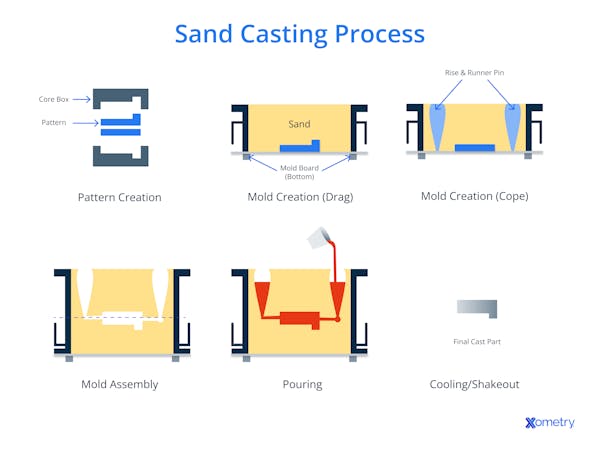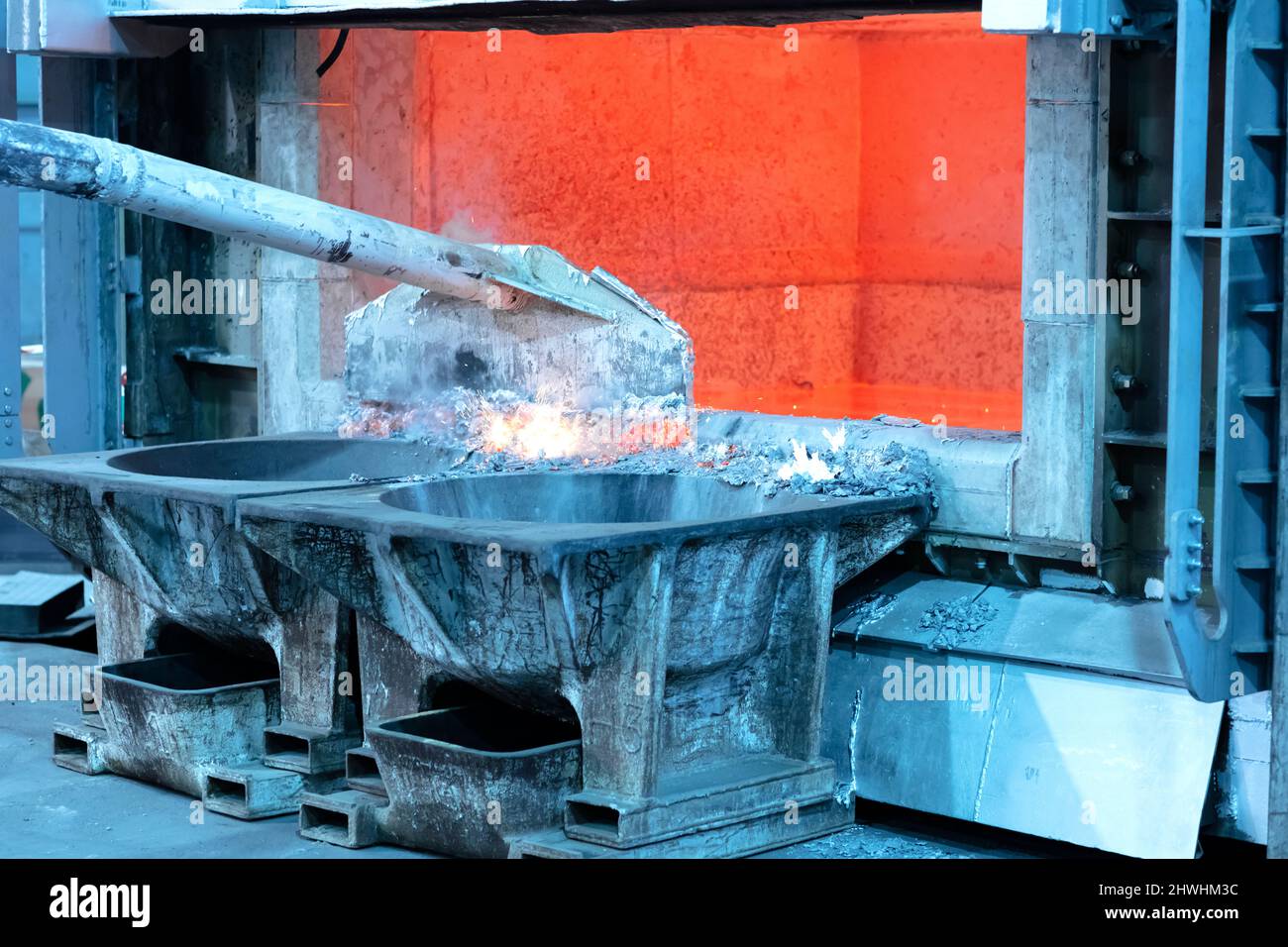Exploring the strengths of Aluminum Foundry Wisconsin in casting work
Wiki Article
Comprehending the Advantages and Innovations in the Aluminum Foundry Sector
The Aluminum Foundry sector plays a necessary function in contemporary production. Its lightweight homes especially improve gas performance, particularly in aerospace and automobile industries. Additionally, Aluminum's resistance to rust warranties long life in different applications. As the market advances, technologies such as innovative recycling and additive production are improving manufacturing techniques. Checking out these improvements exposes not only the benefits but likewise the challenges ahead for Aluminum foundries in a rapidly changing market.The Lightweight Benefit of Aluminum
Aluminum's light-weight nature uses considerable benefits across numerous sectors, especially in production and transport. Its low thickness permits the production of components that are easier to manage and set up, resulting in lowered labor costs and boosted effectiveness. In the vehicle market, lighter automobiles add to enhanced gas economy and reduced emissions, straightening with international sustainability objectives. In aerospace, the usage of Aluminum decreases the total weight of aircraft, which is essential for improving efficiency and reducing functional expenses.Furthermore, Aluminum's lightweight residential or commercial properties assist in innovative styles that were formerly impractical with larger products. This adaptability enables makers to create complicated forms and frameworks while maintaining architectural integrity. In general, the light-weight advantage of Aluminum not only boosts product performance yet likewise drives advancements in technology and style, making it a recommended material in various applications.
Deterioration Resistance and Toughness
The Aluminum Foundry industry is renowned for generating products with exceptional rust resistance, making them optimal for numerous applications. This residential property, combined with enhanced structural integrity, adds to the durable efficiency benefits that Aluminum elements provide. Consequently, sectors significantly rely upon Aluminum to meet demanding environmental conditions without jeopardizing high quality.
Superior Rust Resistance
While different steels deal with considerable obstacles from ecological variables, Aluminum sticks out for its premium deterioration resistance, making it a recommended choice in several applications. This home is primarily due to an all-natural oxide layer that creates on the Aluminum surface area, giving a barrier against dampness and destructive agents. Unlike various other steels that might rust or degrade over time, Aluminum keeps its stability also in extreme settings, such as coastal locations or commercial setups. In addition, its lightweight nature combined with deterioration resistance makes it excellent for applications in aerospace, auto, and marine industries. On the whole, Aluminum's exceptional durability not just improves item long life but additionally minimizes maintenance prices, providing an engaging advantage for customers and makers alike.Enhanced Architectural Stability
Developers and engineers increasingly identify the significance of boosted structural stability in modern applications, where both rust resistance and resilience are critical. Aluminum alloys, understood for their lightweight homes, additionally show extraordinary resistance to corrosion, making them ideal for harsh settings. The innovative strategies employed in the Aluminum Foundry market contribute significantly to producing elements with enhanced longevity. Advanced casting processes and alloy structures are customized to satisfy details efficiency requirements, ensuring that structures can stand up to severe problems without compromising stability. Surface treatments and finishings improve the life-span of Aluminum items, better mitigating wear and tear over time. This concentrate on improved architectural honesty not just prolongs the use of products yet also decreases maintenance prices, strengthening Aluminum's placement as a product of selection in numerous sectors.Lasting Performance Benefits
Long-lasting efficiency in Aluminum components is largely attributed to their exceptional corrosion resistance and resilience. Unlike numerous metals, Aluminum naturally creates a safety oxide layer, which stops corrosion and damage in numerous settings, consisting of marine and industrial setups. This intrinsic property considerably extends the life-span of Aluminum products, minimizing upkeep and substitute costs. Additionally, the light-weight nature of Aluminum enhances its applicability throughout markets without compromising stamina. The material's resistance to deterioration additionally adds to its reliability sought after applications, making it an ideal option for auto, aerospace, and building and construction industries. As markets increasingly prioritize sustainability and longevity, Aluminum's efficiency advantages line up with modern engineering demands, solidifying its duty in ingenious production processes.Environmental Influence and Sustainability
 As the Aluminum Foundry industry develops, it significantly prioritizes environmental effect and sustainability, recognizing the requirement for liable practices when faced with environment change. Initiatives to minimize waste and power intake go to the leading edge, with numerous factories taking on reusing campaigns to reclaim Aluminum scrap. This not only lowers resources usage yet also significantly lowers energy expenditure, as recycled Aluminum needs just a fraction of the energy compared to key production.
As the Aluminum Foundry industry develops, it significantly prioritizes environmental effect and sustainability, recognizing the requirement for liable practices when faced with environment change. Initiatives to minimize waste and power intake go to the leading edge, with numerous factories taking on reusing campaigns to reclaim Aluminum scrap. This not only lowers resources usage yet also significantly lowers energy expenditure, as recycled Aluminum needs just a fraction of the energy compared to key production.In addition, developments in discharges regulate technologies are being carried out to decrease air pollutants, aligning procedures with more stringent environmental regulations. Factories are likewise checking out alternate energy resources, such as solar and wind, to power their centers sustainably. By cultivating partnership with stakeholders, the market aims to develop cutting-edge remedies that boost environmental stewardship. Collectively, these initiatives highlight a commitment to decreasing the Aluminum Foundry's carbon footprint while advertising a round economic climate within the manufacturing industry.
Advanced Production Techniques
 Transforming production procedures, the Aluminum Foundry sector is significantly integrating innovative manufacturing strategies to improve efficiency and accuracy. Techniques such as computer system mathematical control (CNC) machining and additive manufacturing have actually emerged as essential parts in optimizing manufacturing workflows. CNC machining enables for high-precision part construction, greatly minimizing product waste and production time. Additive production opens up new opportunities for intricate geometries and lightweight styles that were formerly difficult to accomplish.
Transforming production procedures, the Aluminum Foundry sector is significantly integrating innovative manufacturing strategies to improve efficiency and accuracy. Techniques such as computer system mathematical control (CNC) machining and additive manufacturing have actually emerged as essential parts in optimizing manufacturing workflows. CNC machining enables for high-precision part construction, greatly minimizing product waste and production time. Additive production opens up new opportunities for intricate geometries and lightweight styles that were formerly difficult to accomplish.Furthermore, the implementation of automation and robotics in Aluminum shops improves procedures, lessens human mistake, and improves employee safety. These modern technologies help with an even more receptive manufacturing environment, enabling makers to adapt rapidly to market needs. The assimilation of innovative simulation software even more enhances the design and testing phases, leading to premium product quality. Collectively, these methods not only improve operational efficiency however likewise foster technology, placing the Aluminum Foundry sector at the leading edge of contemporary manufacturing.
Technologies in Reusing Procedures
The Aluminum Foundry sector is not just progressing in making techniques but is also making significant strides in reusing procedures. Innovations are arising to boost the performance of reusing techniques, reducing power usage and enhancing sustainability. Advanced arranging innovations, such as automated optical sorting, make it possible for the identification and separation of Aluminum from various other materials with high accuracy. This causes a higher quality of recycled Aluminum, which is essential for keeping the stability of the end products.
Closed-loop recycling systems are being applied, enabling manufacturers to recycle Aluminum scrap within their own production procedures. This minimizes waste and advertises a circular economic situation. Additionally, study into brand-new recycling techniques, such as hydrometallurgical processes, offers the capacity for recovering Aluminum go to the website from complicated waste streams. These developments not just add to minimizing the carbon footprint of the Aluminum Foundry market yet also boost its economic practicality in an increasingly ecologically aware market.
Applications Across Different Industries
Numerous industries are increasingly you can try these out acknowledging the convenience and benefits of Aluminum Foundry products, resulting in widespread applications throughout industries such as vehicle, aerospace, consumer, and building goods. In the automotive industry, Aluminum castings add to light-weight vehicle designs, enhancing gas performance and performance. Aerospace producers use Aluminum elements for their strength-to-weight proportion, crucial for aircraft frameworks and parts.In construction, Aluminum is preferred for its resilience and resistance to corrosion, making it optimal for window frameworks, roof, and structural supports. Customer items additionally gain from Aluminum Foundry items, as seen in kitchenware, electronics, and packaging, where lightweight and recyclable products are essential.
The flexibility of Aluminum Foundry strategies enables accurate specifications and intricate layouts, dealing with the diverse needs of these industries. Consequently, Aluminum Foundry items are ending up being essential to modern production procedures across various fields.
Future Trends in Aluminum Foundries
As sectors remain to progress, Aluminum factories are poised to accept numerous vital trends that assure to improve effectiveness and sustainability. One prominent fad is the boosting adoption of electronic innovations, consisting of automation and fabricated intelligence, which streamline procedures and boost quality assurance. In addition, the press in the direction of sustainable techniques is leading shops to purchase reusing innovations, considerably decreasing waste and energy usage. Another arising fad is making use of sophisticated alloys and products, accommodating the growing demand for long lasting and light-weight components across different markets (Aluminum Foundry). The assimilation of additive production strategies is prepared for to revolutionize part design, providing modification and lowering lead times.
Another arising fad is making use of sophisticated alloys and products, accommodating the growing demand for long lasting and light-weight components across different markets (Aluminum Foundry). The assimilation of additive production strategies is prepared for to revolutionize part design, providing modification and lowering lead times.Collaboration with research study establishments is additionally anticipated to drive innovation, as factories look for to develop brand-new procedures and products. Aluminum Foundry. Collectively, these patterns suggest a transformative future for the Aluminum Foundry market, lining up with wider objectives of sustainability and performance
Regularly Asked Questions
What Are the Typical Costs Connected With Aluminum Foundry Manufacturing?
The regular prices related to Aluminum Foundry manufacturing consist of raw products, labor, energy, equipment maintenance, and overhead expenditures. These variables jointly affect the general monetary investment required for efficient Aluminum spreading procedures.Exactly How Does Aluminum Compare to Other Metals in Stamina?
Aluminum, while lighter than many steels, exhibits excellent strength-to-weight ratios. Contrasted to steel, Aluminum is much less strong yet read what he said offers excellent deterioration resistance, making it a desirable option in applications where weight and longevity are necessary.What Security Measures Remain In Location in Aluminum Foundries?
Precaution in Aluminum shops usually include necessary personal protective tools, ventilation systems to control fumes, routine equipment upkeep, training programs for staff members, and adherence to strict security regulations to decrease dangers related to molten steel handling.Just How Is Top Quality Control Managed in Aluminum Spreading Processes?
Quality control in Aluminum casting procedures includes extensive assessments at various stages, consisting of basic material analysis, process surveillance, and end product screening. Techniques such as analytical process control and non-destructive screening guarantee adherence to market criteria.What Accreditations Are Necessary for Aluminum Foundry Vendors?
The significance of accreditations for Aluminum Foundry distributors includes ISO 9001 for high quality management, ISO 14001 for environmental monitoring, and industry-specific standards like ASTM and SAE, making sure compliance, security, and reliability in making processes.The Aluminum Foundry market plays a necessary function in modern production. The Aluminum Foundry sector is renowned for producing products with premium corrosion resistance, making them suitable for numerous applications. Revolutionizing production procedures, the Aluminum Foundry sector is significantly integrating advanced production strategies to boost performance and accuracy. The Aluminum Foundry market is not only advancing in manufacturing techniques but is likewise making considerable strides in reusing procedures. As industries continue to evolve, Aluminum foundries are poised to embrace several essential patterns that guarantee to improve effectiveness and sustainability.
Report this wiki page